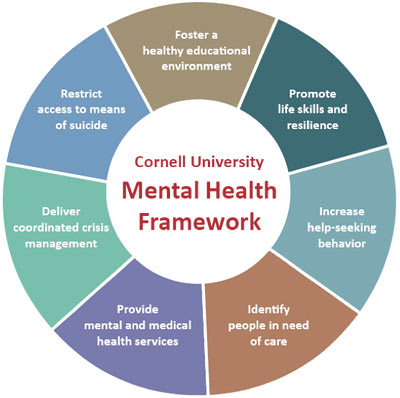Mental health framework takes a comprehensive approach
By Susan Kelley

What's the best way for a university to promote the mental health of its students? For Cornell, it's caring for the whole person, through a comprehensive public health approach that takes its cues from the best practices in the field.
"At Cornell, we believe well-being 'takes a village,'" said Tim Marchell, Gannett Health Services' director of mental health initiatives. "That means neighbors caring for neighbors and a community commitment to values, infrastructure, services and actions that help our students thrive, support those at risk and protect those in crisis."
Cornell's mental health framework includes policies and programs that:
Foster a healthy educational environment. The university's strategic plan makes the promotion of student health and well-being an explicit goal. To help make it a reality, the Council on Mental Health and Welfare engages faculty, staff and student leaders in ongoing review of campuswide needs and strategies. Faculty are reviewing the academic calendar and best practices in teaching and advising to reduce unnecessary stress, while Cornell Plantations staff and volunteers promote the restorative benefits of nature. The Student Assembly's "Lift Your Spirits" events are designed to build a sense of community support and pride.
Promote life skills and resilience. Community-building initiatives in residence halls, houses, co-ops, fraternities, sororities, and the graduate and professional schools foster the social connections and concerns that are vital to individual well-being. The Learning Strategies Center teaches time management and study skills, while advising offices help students manage the opportunities and setbacks they experience with their academics.
Increase help-seeking behavior. President David Skorton is clear about this priority: "If you learn anything at Cornell, learn to ask for help." The new Orientation video "Real Students, Reel Stories" provides student-to-student guidance about how, when, and where to seek help. Trained volunteers offer peers free anonymous counseling via Empathy, Assistance and Referral Services (EARS), and walk-in consultations with Gannett counselors at nine "Let's Talk" campus locations make it easier for students to seek help. Cornell Minds Matter programs, from yoga to journaling, promote mental health and work to reduce the stigma of mental illness.
Identify people in need of care. Cornell's "caring community" has a growing network of faculty, staff, and students who are trained to recognize signs of distress and prepared to reach out. Handbooks for faculty and staff, Gannett's "Notice & Respond" seminars and web resources, and a parent e-newsletter provide ready access to strategies and resources for helping students in need connect to appropriate services. Gannett initiates contact with students who identify a history of mental health concerns before they arrive at Cornell, as well as those who indicate struggles with depression, anxiety, or substance abuse on a primary care screening tool. Cornell's multidisciplinary Alert Team meets weekly to discuss students whose well-being is of concern to others.
Provide mental health and medical health services. Gannett offers integrated services to care for the "whole person." Students who go there for primary care can find mental health care as well. Counseling and psychiatry services include same-day triage, emergency care and off-campus referrals. The university is dedicating an additional $1 million to enhance access to these services.
Deliver coordinated crisis management. Gannett offers direct phone consultation with a health care provider seven days a week, day and night. Cornell University Police and crisis managers are on call at all times to coordinate the university's response to crisis situations. The Community Support Team provides support for groups of students and others in the aftermath of tragedies or other crises.
Restrict access to means of suicide. Cornell secures access to chemicals, weapons and equipment that could be used as a means of suicide. The university and the City of Ithaca also are studying options for modifying or adding safety structures on or under the high gorge bridges.
Media Contact
Get Cornell news delivered right to your inbox.
Subscribe